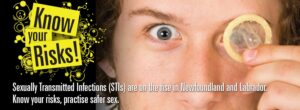Sexually Transmitted Blood Borne Infections (STBBIs)
 Sexually transmitted and blood-borne infections (STBBIs) are also known as sexually transmitted diseases (STDs) or sexually transmitted infections (STIs). These infectious diseases are passed from person to person through oral, anal and vaginal sexual contact, skin-to-skin genital contact, or sharing sex toys.
Sexually transmitted and blood-borne infections (STBBIs) are also known as sexually transmitted diseases (STDs) or sexually transmitted infections (STIs). These infectious diseases are passed from person to person through oral, anal and vaginal sexual contact, skin-to-skin genital contact, or sharing sex toys.
There are three main categories of STBBIs:
- Viral infections: HPV (human papillomavirus), Genital Herpes, Hepatitis B and HIV (Human Immunodeficiency Virus)
- Bacterial infections: Chlamydia, Gonorrhea and Syphilis
- Parasitic infections: Trichomoniasis, pubic lice and scabies.
STBBIs are a serious health concern. Early detection helps reduce the spread and decrease health complications. Treatment is available for most STBBIs.
Many STBBIs show no signs or symptoms and can go unnoticed and untreated. If left untreated, STBBIs can lead to serious long-term health problems such as infertility (the inability to have a baby) and even death.
Prevention is key to protecting yourself and your partner.
- Talk about STBBIs and safer sex options with every partner to ensure you protect one another.
- Use a condom and/or oral dam properly and consistently each time you are sexually active.
- See your healthcare provider or go to a sexual health clinic to be tested for STBBIs if you are sexually active or starting a sexual relationship with a new partner.
- You and your partner should be tested for STBBIs before becoming sexually active and then again in three to six months.
- Get tested for STBBIs regularly as part of your routine health screening.
- Check that you are up to date with vaccinations against Hepatitis and HPV (Human Papillomavirus)
You can’t tell if someone has an STBBI by looking at them; the only way to know is to get tested.
Services related to this information:
- Contact Planned Parenthood — NL Sexual Health Centre at 1-877 NO MYTHS (666-9847) or 709-579-1009
- Contact your Public Health Nurse:
- 811 HealthLine (Newfoundland & Labrador) – Call 811 or 1-888-709-2929 / TTY 1-888-709-3555
Eastern-Urban:
- Contact the Sexual Health Clinic at sexualhealthclinic@easternhealth.ca.
- Contact the community walk-in clinic (Mundy Pond) at 709-777-1706
